I received the following letter and enclosure from Sue Andrews in January this year. I asked Sue's permission to reprint
it in the Chronicle, entirely as she sent it to me. The historical information contained here is fascinating, and although
it appeared unlikely that John Alabaster, our many times great grandfather (ten greats in my case), would be
honoured in this way, how wonderful that his good deeds are still being remembered so long after his death. How
many people from today will be recalled in the year 2369, I wonder!In act, I can now report, that Hadleigh's new
primary school will be called the Beaumont School. However, we can take some consolation in the knowledge that
Ann Beaumont, another local benefactor, was related to the Alabaster family!
Dear Laraine, I enclose a copy of a letter I recently sent to Jan Byrne, Hadleigh Town Councillor, who is on the
committee for selecting a name for the new primary school currently being erected in Hadleigh. She asked me, as
Hadleigh Archivist, if there were any names of people and places in Hadleigh that would be appropriate. Immediately,
I suggested John Alabaster School or Alabaster School and Jan took to the idea, having heard me mention the family
and their good works in Hadleigh. She asked me for some information, hence the letter.
The naming of Hadleigh's new Primary School:
The case for John Alabaster, 1561 - 1637
by Sue Andrews
John Alabaster was born in Hadleigh and baptised in the Parish Church in 1561. He was the second son of Thomas
and Christian Alabaster.
The Alabaster family had sanguineous connections with the Forths of Hadleigh, Stewards ofthe Manor of Hadleigh
Hall, with Nicholas Shaxton, Bishop of Salisbury and later Bishop of Ely and with the poet William Alabaster. Through
marriage, the Alabasters were also related to the Winthrops, Lords of the Manor of Groton and founders ofthe
Protestant Colony at Boston in Massachusetts, and to John Still, Rector of Hadleigh and later Bishop of Bath and
Wells.
Nothing is known of John Alabaster's childhood but he probably attended Hadleigh Grammar School in the Guildhall
where he was a contemporary of John Boise and John Overall, who both later worked on the translations for King
James's Authorised Version of the Bible.
John followed his father Thomas, not only into the family business as a successful clothier in the woollen-cloth
industry that was still flourishing in Hadleigh at this time, but also into public service. As a Chief Inhabitant of
Hadleigh, his father Thomas had shared responsibility for running the town during a most difficult time of inflation
and high unemployment that had led to much poverty. In 1588 at the age oftwenty-seven, John took over his father's
role by joining the Town Trustees, who were responsible for managing the market, the Pykenham and Raven
Almshouses and other Town Lands, the profits ftom which supported the poor. On four occasions, he held office as
Chief Collector for Town Lands, for which he kept his own accounts of the income and disbursements for maintaining
the various properties and for charitable distributions of cash, fuel and clothing.
For some time, lobbying had taken place for official status for those governing the town. In 1618, King James I
granted a Borough Charter that incorporated eight aldermen, with one of their number to be annually elected as
mayor. Sessions of the Peace were also established with the Mayor sitting as Justice of the Peace for his mayoralty
and the following year. John Alabaster was the second Mayor in 1619 and again in 1630. However, he sat as Justice
in 1619 and 1620, 1622 to 1626 and again ftom 1629 to 1631. In 1628, John was selected by the County to act as Lay
Subsidy Commissioner in the Hundred of Cosford.
During the 1620s, John was assessed for taxation purposes on the value of his goods even though he owned
approximately 300 acres of land and numerous houses throughout the town, which made him the second wealthiest
person living in Hadleigh.
At his marriage in 1584 to Mary, daughter of John Brond, clothier of Boxford, manorial lord of Polstead, Nether
Nusteeds in Polstead, and Castells in Thorpe Morieux, John's father had settled upon the young couple property in
Bridge Street. The Alabaster family home is now the site of Babergh District Council Headquarters. John and Mary had
nine daughters and two sons, both of whom followed their father into the office of Town Mayor. In 1637, during a very
harsh visitation of plague in Hadleigh, John Alabaster died aged 76 and was buried in the Parish Church. His
monumental brass (now placed below that of his father on the south chapel wall) tells us that........... he lived a godly
and discreet life and was of holy conversation, for whose death the rich did mourne and the poore did much lament.
He was kynde to the rich and mercifull to the poore and lovinge to all.......
In his will, John made provision in real and personal estate for his wife, his adult children and their families. He gave
monetary tokens to the mayor, the rector and the curate and to men with whom he had shared not only friendship but
also the responsibility of town government. His business agent in London, long-serving craft workers, his spinners,
and household servants were also remembered. He requested that within a week of his death, £20 in bread be
distributed to the poor. He also passed on to his son, as had been passed from his father and uncle to himself,
responsibility for four cottages, three in Bridge Street and one in Duke Street, the rents from which were to provide
thirteen poor people with bread every Sunday in perpetuity.
Also, he left a tenement in Bridge Street and twelve acres of land in Coram Street to the Incorporation of Hadleigh,
the profits from which were to be .... employed for a stipend to an honest, sober and sufficient man who shall teach
poor children of the Town of Hadley to read English, to write and cast accompt... This was the beginning of
elementary education in Hadleigh with the master chosen by the rector and together with the mayor, he was also to
select the pupils who were to receive a free education. The tenement was to be a house for the master and
schoolroom for his charges. John was careful to ensure that his school did not interfere with the viability ofHadleigh's
other school by stipulating that his master. .. shall never meddle with or clayme any stipend formerly given and payed
usually to the teacher of the Grammar School. Unfortunately the 12 acres at Coram Street were only held as security
for a mortgage, which was promptly repaid. However, his son John as executor, wishing to fulfil the will's bequests,
purchased lands to greater value just beyond Toppesfield Bridge, which later became known as School Meadow.
No details would seem to have survived regarding the operation of the school. During the eighteenth century, it was
referred to as Hart's Writing School after the master and later, as its endowments were amalgamated with those for
the almshouses, as Pykenham 's School.
The endowed lands were eventually sold in 1868 to Holbecks Estate and the income invested in consols. The
schoolbuilding, originally called Posfords, was pulled down in 1853 when a new master's house and National School
were erected on the site that continued as Bridge Street Boys'School. In 1905, when educational charities were taken
out of the hands of the Grand Feoffment, the John Alabaster Education Foundation Charity continued to maintain the
house and playground.
In 1968, when the boys were transferred to the newly built Saint Mary's Church of England Primary School, the old
school and master's house went into private ownership. Funds arising fi'om the school-house sale went to the
Alabaster Charity, which now makes grants for fees or expenses to those students under the age of 25 from Hadleigh
and neighbouring areas, who live away from home in order to further their education.
Although it was John Alabaster's wish that his charity be applied to elementary education only, since 1853 this has
not been the case. Until 1968, the charity provided free accommodation for the head-teacher at Bridge Street School
and now, under a resolution made by the trustees under the 1985 Charities Act, other types of education can be
considered.
It would be of significance to the town to name the new primary school either Alabaster or even John Alabaster as
recognition, which is long overdue to the Hadleigh-born man who had the foresight to be first in establishing primary
education here over 366 years ago.
This is the first of a possible regular feature of Alabaster family members who
would like to find Alabaster penfriends to write to around the world.
So far, it is the younger generation who are getting involved, but if you are a
letter writer, of any age, and would like to exchange letters with others of
similar age and interests, please do send me a similar outline description of
yourself for future Alabaster Chronicles.
Obviously, letters of reply will be sent direct, and will be just between the
penfriends, but it would be great to be able to report back here of any
successful outcomes, so please do keep me informed!
*******
Floriane (right) - I am 12 years old and I like dancing, skiing, swimming,
cooking and music. We have a dog, two cats and a fish and a large quantity of
weird birds. I would like some friends from England and Germany (I'm in my
second year of German at school) with the same interests so that we can write
to each other and possibly prepare exchange visits, as I live in France. Other
nationalities are more than welcome but visits would be harder to arrange!
Mum is an Alabaster. (address from Laraine Hake).
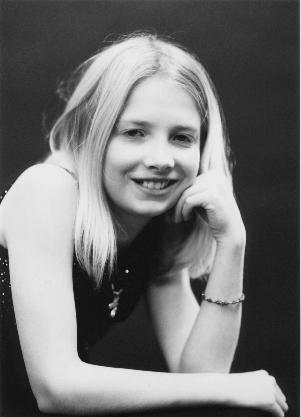
*******
Isaline (left) - I am 10 years old and I like dancing, music, riding and
skiing. I have my own pony - we live on a farm in France! I would like
some friends from England (why not the sisters of Floriane's pen-pals
if possible?) It would be nice to know other Alabasters around the
world too ! Mum is an Alabaster. Hear from you soon. (address from
Laraine Hake).
*******
Hi! My name is Sydney Alabaster (pictured below right).
I have five people in my family, my Mom, my Dad, my brother Sam,
and my sister Sofie, and me (I am a girl!) I have two kittens as well.
Their names are Fred and Ginger. They are brother and sister. Both of
them are the same age. Ginger, the girl, is my kitten. Fred, the boy, is
the family's kitten.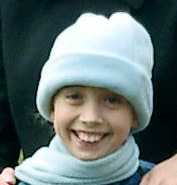
I live in New York, in a little town.
I like to sing and do gymnastics. I also
like to dance, read, swim, draw, horseback riding, and photography. I also like to work on
the computer.
My favorite books are the Harry Potter series, and one that I'm currently reading called
Sally J. Freedman Starring as Herself.
I was born on November 30th, 1993. That means I am almost ten years old!!!!
I am in 4th grade, and my favorite subjects are science and reading.
My role model is my Mom because the way she works so hard and tries to help
everybody. She is teaching me things like skiing, horseback riding, and gardening. My
Mom tells me things about her life that makes me understand life too. I always like to talk with my Mom about
everything. I am not afraid to tell her anything that I am bothered about. I encourage all kids to do that too.
My Dad is the funniest person I know. He can make my laugh for about an hour.
Sydney Alabaster`s address is available on application to Laraine Hake.
*******
Hi - I'm Olivia, I'm 16 and I live in Edinburgh. I like films (e.g. "Donnie Darko" and "It's a Wonderful Life"), music
(Coldplay, Elvis, Royksopp) and having fun! At school I study English, German, History, Modern Studies and Biology,
and I also enjoy photography and reading. I just think it could be interesting to have a penfriend boy or girl - from
some other area of Britain or the world!
Olivia Alabaster, 36 Warrender Park Terrace, Edinburgh, EH9 1ED, UK
*******
Prospective correspondents should note that this article appeared in 2003.
IMPORTANT
Younger readers are reminded that UNDER NO CIRCUMSTANCES should they reply to any message or approach, by
email or otherwise, unless the identity of the sender is PERSONALLY known to them or their parents, or until their
identity has been checked and confirmed by the Hon. Sec. Laraine Hake.
If in any doubt, DO NOT REPLY.
by Laraine Hake and Peter Copsey
New information and clues that help fill out our knowledge of Alabaster Family History come from many different
sources. Occasionally, as in this case, a genealogist researching his own family line kindly keeps an eye open for any
Alabaster references. Peter Copsey, a fellow member of the Guild of One Name Studies, has done just that, sending
me a variety of occurrences ofthe name Alabaster over the space of time. Naturally, some of these I already had, but
in several cases they are new to our records. Below is a copy of an email he sent to me last December, together with
my explanations/discoveries relating to the information he sent. Peter's words are in italics, mine are in normal print.
Hi Laraine. Here are some more Alabasters that I found whilst looking for Copseys.
1861 Census for Bethnal Green
Re! RG9/25 0 12 New Nichol Street.
John ALABASTER head, Mar, 54, chair maker b. Whitechapel.
Mary ditto wife, Mar, 26, b. Bethnal Green
Thomas ditto son, Unm, 18, chair maker b. Bethnal Green
David ditto son, Unm, 15, chair maker b. Bethnal Green
William ditto son, Unm, 13, b. Bethnal Green
Sarah ditto daur, 11, b. Bethnal Green
Branch IIIB John (1806-1886). First wife was Mary Holt, but she would have been about 52 by 1861. A Mary Ann
Alabaster had died in Bethnal Green in 1857, and this could have been Mary (nee Holt).
Presumably the Mary above, aged 26, was the Mary Ann Levy whom John married 18 months later on 9th October
1862.
John and his first wife, Mary, were the 3 x gt grandparents of several of the members of Branch IIIB
RG9/250 folio 126L 13 Austin Street.
John ALLIBASTER Head, mar, 27, chair maker b. Bethnal Green
Martha ditto Wife, mar, 23, b. Bethnal Green
John ditto Son 1, b. Bethnal Green
Branch IIIB This is John James (1833-1888) eldest son of John and Mary (Holt). Martha (nee Waterman) was his
second wife too, his first wife, Sophia, and son, John, having both died in September 1858, shortly after the baby
John's birth.
RG9/251 folio 102L 3 Caroline Street
Susan ALABASTER Head, widow, 53, - b. Bethnal Green
Betsy ditto Daur, Unm, 28, fancy trimming maker, b. Bethnal Green
Thomas ditto Son, Unm, 26, carpenter, b. Bethnal Green
Fanny ditto Daur, Unm, 19, fancy trimming maker, b. Bethnal Green
Mary A. ditto Daur, Unm, 17, dressmaker, b. Bethnal Green
George ditto Son, Unm, 21, carpenter, b. Bethnal Green
Henry ditto Son, Unm, 15, carpenter, b. Bethnal Green
Walter ditto Son, 12, scholar, b. Bethnal Green
Alfred ditto Son, 9, scholar, b. Bethnal Green
WofW branch. This is Susan (nee Lingley) the widow of Thomas Alabaster (1808 - 1859) She was the gt gt
grandmother, (or more) of each of the William of Woodford branch members of the Society!
RG9/252folio 91L 3 Virginia Row .
Josh. ALABASTER Head, Mar, 64, shoe maker, b. Wapping
Ann ditto Wife, Mar, 57, Silk winder, b. Coventry, Warwicks
Mary ditto Daur, Unm, 17, worsted winder, b. Bethnal Green.
Branch IIIB Joseph Alabaster (1796-1878) was the elder brother of John. Mary (or Marianne) was the youngest of
Joseph and Ann's four children. Joseph and Ann were the 3 x gt grandparents of many other members of Branch IIIB.
Parish Register of Holy Trinity, Harrow Green, Leytonstone. Baptisms
1909 Feb 28 Winifred Lily Katherine daur of Frederick & Louisa ALABASTER, 38 Dunedin Road, bricklayer. No birth
date given.
1911 Oct 15 Arthur Frederick son of Frederick & Louisa ALABASTER, 38 Dunedin Road, bricklayer. No birth date given.
1911 Oct 15 Edwin James son of Frederick & Louisa ALABASTER, 38 Dunedin Road, bricklayer. No birth date given.
Branch IIA Frederick Alabaster (1879-1941) I did have the births, but not the baptisms of Arthur and Edwin, who were
twins, but I had not previously placed Winifred in a family.
There are no descendants of Frederick and Louisa in the Society, but his father, Edwin, was the brother of my gt
grandfather, Thomas, (and the gt grandfather of several other members!) and of Sarah Alabaster, gt grandmother of
Tony Springall.
St Michael & All Angels, Walthamstow - Baptisms 1901 Oct 7
Elsie Georgina daur of George & Charlotte ALABASTER, 25 Haroldstone(?) Road, labourer. No birth date given.
1903 May 14 Charles Alfred son of George Thomas & Charlotte Caroline ALABASTER, 25 Hardlater(?) Road, general
labourer. No birth date given.
This is WofW Branch, George Thomas Alabaster (1864-1936) being the grandson of Thomas Alabaster and Susannah
Lingley, and the son of George, aged 21 on 1861 census (above). I did not previously have either of these baptisms!
George and Charlotte were the grandparents of Brian Alabaster and the gt grandparents of Josie and Malcolm
Alabaster, all members of our Society............in fact, Charles Alfred, the baby being baptised in 1903, was Josie's
grandfather!
St Saviour, Walthamstow - Baptisms 1908 Feb 9
Herbert Sidney son ofSidney Herbert & Daisy Florence ALABASTER, 34 Camden Road, bricklayer. Born 12 Jan 1908.
Branch IIA - Herbert Sidney is actually the father of two of our members, Tricia Dyer and Colin Alabaster. I did not
have details of his baptism and I do not suppose they did previously either!
1908 Nov 6 Ellen Jane daur of John William & Augusta Campbell ALABASTER, 33 Beaconsfield Road, greengrocer.
Born 10 Oct 1908.
This one is a complete mystery! All that I can ascertain is that Augusta died in the registration district of Shoreditch in
1918, aged 34.
If anybody can place a John William, Augusta and Ellen Jane Alabaster in their ancestry, I would love to hear about it!
St James the Great, Bethnal Green - Baptisms
1898 Nov 27 Charles Thomas son of William & Agnes ALABASTER, 12 Peacock Street, carman. Born 9 Nov 1898.
William and Agnes are Branch IIIB. Steve Abbott wrote about them in detail in Chronicle 17. William was the grandson
of John Alabaster, of the first census given above.
St Matthew, Bethnal Green - Baptisms
1904 May 1 James Edwin son of James & Matilda Amelia ALABASTER, 153 Vallance Road, porter. No birth date given.
James and Matilda are Branch IIB. They are the grandparents of Michael William Alabaster, so James Edwin was
Michael's uncle. We did not previously have this baptism either!
St John, Bethnal Green - Baptisms
1891 Oct 17 George son of Edward & Harriett ALABASTER, 3 Thurlow Place, labourer. Born 21 May 1887.
1896 Apr 26 Lilian daur of Edward & Lydia ALABASTER, 298(?) Glebe (or Globe) Road, dyer. Born 6 April. God parent
Agnes AGARS(?)
These are Branch IIB again, the Edward and Harriett being the parents of the second Edward. Edward the elder was
the brother of the father of James, above, so Edward the younger and James were first cousins.
Another son of Edward and Harriett, Robert William, emigrated to Australia just before World War I. His descendants
include several Alabasters now living in the Melbourne area of Australia.
Enjoy your Christmas and good luck in 2003. Cheers, Peter Copsey.
I am sure you will agree that we owe Peter Copsey a debt of gratitude. This is not the only such list that he has sent
to me! Please remember that I am always grateful for any Alabaster information at all, to help piece together the
overall picture, so if you do have any family artefacts which include details of names and dates, I would be very
grateful for such information! Do look out for the name Copsey too!
Late news! I have just received another email from Peter Copsey, entitled "Alabasters for Easter"!
All Saints, Leyton (West Ham RD) - Baptisms
1938 Jan 30 Brian son of Ernest Thomas & Lilian May ALABASTER, 153 Beaumont Road, Leyton. Painter. Born 28 Dec
1937.
I truly think I can say this is a first for me! This baptism is not just of one of our ancestors, it is actually the baptism of
a member of the Alabaster Society!!! Here you are, Brian, this is YOUR baptism! Brian is a member ofWofW Branch!
Christ Church, Leyton (West Ham RD) - Baptisms
1935 Sept 8 Arthur Edwin son of Edwin James & Fanny Nora ALABASTER, 6 Newport Road, Leyton. Carpenter. Born 31
July 1935.
1938 June 26 Roger Thomas son of Edwin James & Fanny Nora ALABASTER, 6 Newport Road, Leyton. Carpenter. Born
25 April 1938.
God parent - Donald WASPE.
Branch IIA - the father here, Edwin James is one of the twins, baptised in 1911.
St Luke, Leyton (West Ham RD) - Baptisms
1939 Jan 22 Colin Frederick son of Arthur Frederick & Rose May ALABASTER, 463 Grove Green Road, E11. Bricklayer.
Born 26 Nov 1938 (or possibly 1928)
1950 Nov 5 Patricia Rose daur of Arthur Frederick & Rose May ALABASTER, 100 River Road Born 29 July 1950.
....and the father here, Arthur Frederick, is the other one of those twins, baptised in 1911.
St Stephen, Upton Park (West Ham RD) - Baptisms
1927 May 11 George William son of Charles Henry & Lilian Maud ALABASTER, 9 Park Road, East Ham. Labourer. Born
25 April 1927.
Branch IIIA - George William was one of the earlier members of the Alabaster Society, number 28, until his death in
October 1993.
St Andrew, Walthamstow (West Ham RD) - Baptisms
1947 Oct 5 Janet daur of John Henry & Winifred May ALABASTER, 272 Blackhorse Lane, E17. Police constable. Born 21
Aug 1947.
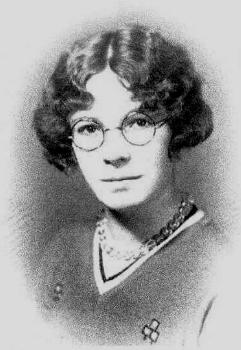 WofW Branch - here it is the parents of the child who are members of the
Alabaster Society! John Henry Alabaster was, and is, one of our earliest
members; number 18! WofW Branch - here it is the parents of the child who are members of the
Alabaster Society! John Henry Alabaster was, and is, one of our earliest
members; number 18!
St James the Greater, Walthamstow (West Ham RD) - Baptisms
1910 Aug (April crossed out) 3 Florence Grace Dorothy daur of Sidney Herbert &
Daisy Florence ALABASTER, 22 Hartington Road. Builder's foreman. Born 6 Nov
1910. This entry was between baptisms of Nov 2 and Nov 9. I suspect that birth
and baptism dates are transposed.
Branch IIA - Florence Grace was the mother of Tony Moore, one of our
members. She was the sister of Herbert Sidney, baptised in 1908 - and I
realised I had a photograph of her (pictured, right)!
1912 Oct 9 Violet Grace daur of George Thomas & Charlotte Caroline
ALABASTER, 70 Gosport Road. Labourer. Born 4 Sept 1912.
WofW branch. George Thomas and Charlotte Caroline were referred to earlier,
with baptisms in 1901 and 1903.
Whew! Thanks again to Peter Copsey!
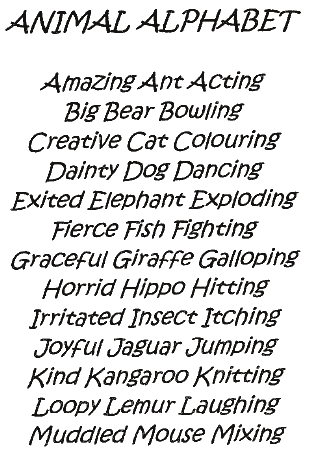

|

........a poem for the 21st century
by Ellen May Alabaster Dunbavin (IV)
aged 9 years |
Phryne Mundy (IIA) reports from Spain to tell me her sister, (Yvonne) Audrey Tilling (nee Alabaster) passed away
Wednesday 13th November 2002.
This was sad news to receive. Audrey was with us at the Alabaster Gathering last April, and contributed a very
interesting page to the Alabaster Book.
Audrey and Phryne were born in Tientsin, China, where their father, Geoffrey Alabaster, worked for the Dunlop Rubber
Company. Audrey had strong memories of Tientsin and Shanghai and remembered sailing to England, via Suez, in
1924, aged 8.
Audrey's grandfather, Henry Alabaster, owned an Electrical Engineering supplement called The Electrical Review. I
managed to buy a bound volume of The Electrical Review, July - December 1889, from an antiquarian bookseller at a
Boot Sale recently! It has Henry Alabaster's name on the frontispiece, and makes fascinating reading, if somewhat
heavy, about the early stages of the introduction of electricity. Headlines of articles include: "Electric Lighting at
Brighton"... ..... "Will Electricity Supplant Gas?" LH
News from Around the World
Tony Moore (IIA) 12th November 2002
Had an enjoyable time going through the Chronicle-some very interesting stuff and the article by our Jim was
especially so. He has certainly had a very varied life and career.
One thing I'm very curious about is the advert for the house in Bexleyheath as we lived at 15 Avenue Road in a house
like the one advertised. It could be Heathside Avenue(or anywhere come to think of it)I do remember going round with
my mother collecting rents and the latter Avenue may have had similar houses.
Amazing that the name still features to this day. Maybe I've already mentioned it but S. H. A's building yard near
Bexleyheath Station traded as Retsabala -Alabaster backwards.
Linton Love (Roger) 3rd November 2002
The Chronicle just caught up to me in Florida where I am until next May. Congratulations on another great issue. I
was particularly interested in the article by Sue Andrews in tracing the properties as that is what I like to do. I find it
fascinating to try to locate the exact locations and then to visit them if possible. In Pennsylvania the old deeds are
described in metes and bounds but no survey. I have a little computer program where I enter this information and it
will plot out the survey with all the points and area calculations. It was the only way I found the exact locations of
farms in Pennsylvania back in the 17th and 18th centuries.
Peter Robert Alabaster (WofW) 14th November 2002
The Alabaster Chronicle arrived a few days ago, containing some interesting articles. On page 26 you mention the
quiz you supplied on the Sunday coach trip. Chris kept a copy and used it at one of her UCM (Union of Catholic
Mothers) meetings. It was very popular. She hopes it wasn't copyright!
Bob Yeldham (IIIB) 29th December 2002
Bob had left the following message on the old Alabaster website: I know that my Nan`s maiden name was Selina
Alabaster, born 26th Dec 1903, she married Leonard Yeldham. There is a connection with Stoke Newington where I
believe my Father was born. 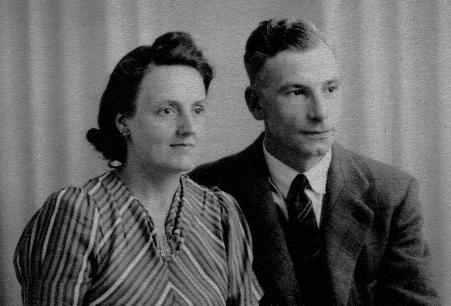 I vaguely remember my Great Nan who at a guess died around 1960. My Nan
mentioned seeing her Father for the last time
boarding a Troop Train to fight in the Great
War. I vaguely remember my Great Nan who at a guess died around 1960. My Nan
mentioned seeing her Father for the last time
boarding a Troop Train to fight in the Great
War.
Much more would be vague as my Father
Edgar Yeldham died in 1994 and the only
source I am aware of would be from my Mum.
Leonard Yeldham and Selina Caroline,
nee Alabaster in 1941.
I was able to reply………….
I have found Selina Caroline Alabaster on my
database, although I have her born in 1904 -
but we won't split hairs about that! I was
confused when you referred to your "great
nan" but I have just checked, Selina's mother,
Elizabeth Charlotte Alabaster, nee Jackson, did
not die until 1962.............although her husband had died in 1918, forty-four years earlier. Doesn't that bring home the
tragedy of war?.......
Until recently, I had been told that he, Joseph Alabaster, had been killed by a train towards the end of the 1st World
War, but I was at the Public Record Office at Kew in November and actually looked at his war record and found that
he died in hospital towards the end of 1918. I actually took a photocopy of his War Record. Joseph died of
broncho-pneumonia, contacted on active service, on 19th November 1918
That is eight days AFTER the Armistice.
Selina Caroline was the granddaughter of Henry Alabaster and Maria Bourne, Branch IIIB. Thus Bob Yeldham is a fairly
close relative of Alabaster Society members, Gwen Lewis and Joan Watts, as well as Reg and Sue Hill. Bob sent me a
photograph of his grandparents:
Sheelagh Neuling/Alabaster (IIA) 6th January 2003
I am delighted to report a new potential penpal born day after Boxing Day: Eloise, daughter of Kim Neuling and Nick
Lines, in Warwick, a stone's throw from where my grandmother, Marguerite Glover lived before she married Arthur
Stanley Alabaster. There's neat! .Born December 27th 2002
Millie Knox (WofW) 3rd February 2003
I see that the Alabasters have got in the news again viz page 50, first paragraph of the Winter 2002 Cockney Ancestor
which we received this morning. You can't keep a good family down!
This is the journal of the East of London Family History Society. The paragraph reads, "Another milestone for the
Society was reached in November 2002. Member number 10,000 joined us, a Mrs Susan Alabaster from Essex." Susan
is the wife of Nicholas Alabaster, son of Robin Alabaster - see wedding photograph at Hadleigh Guildhall, Chronicle
Number 8!
Iona Alabaster (IIA) 11th February 2003
David was talking about what we did on the family day out and was most disappointed when we had to tell him it
would be two years to the next one. He is all ready to book up now.
The pen friends for the children sounds a really good idea, when we get more details I shall tell my granddaughter.
It's always great to hear that the Gathering was enjoyed and remembered, but it did come as a shock to me that there
are only two years to go until the next one…….assuming 2005!
Valerie Knobloch, Germany (IV) 12th March 2003
This message I received from Shirley and John this afternoon:
Dear Valerie, We have found Virtue's death. She died in the December quarter of 1938 aged 85 years, registration
area given as Essex S.W. I am so happy about this that I just had to telephone Shirley and John to thank them.
Shirley and John Alabaster have kindly offered to research for any Alabaster member who is unable to get to London
easily. In this case they had found the details of the death of Virtue Haines (nee Alabaster), gt grandmother of
Valerie.
On a similar vein….Oriole Veldhuis (IIC), in Canada, has been carrying out some research for Ivor Smith (IV) who has
been tracing descendants of Letitia Alabaster (half-sister of Virtue, come to think of it!) Just to complete the circle,
Valerie Knobloch is trying to help Oriole with her research into the origins of her gt grandmother, Elise Harrer in
Germany. Isn't that just fantastic!
Esther Violet Alabaster Robinson (IV) April 2003 aged 5 years
I watched the Borrowers film. The family who own the house is called Alabaster.
Well done, Esther, for noticing something so very important! I have now made a point of watching the film, and Esther
is correct!
The film is based (loosely!) on the book, The Borrowers by Mary Norton, but I am fairly sure that no family of this
name appears there! In the film the house was supposed to be in Leighton Buzzard. Does anybody have any idea why
the name Alabaster was used in the film? Is there anyway in which we could find out?
By No Means his Best Round but Still Below his Age
Alexandra: Age has not slowed former New Zealand test cricketer Jack
Alabaster.
Mr Alabaster, a 72-year-old golfer playing off an 8.3 handicap, had what
he called a pretty good round of golf on Sunday.
The former leg spinner, who played 21 tests between 1955 and 1972,
managed to score a 71 at the Alexandra Golf Club to notch up the rare
feat of scoring under his age.
Par on the course was 72.
Pictured left: Jack Alabaster (IIC)
"I didn`t do anything different. It was just a combination of things, really.
The weather was great - not too much wind, the course is in good
condition and it just happened," he said.
The round included a double bogey on a par 3, a bogey and four birdies.
He added it was not the best round he had had, as he had gone sub-par in
his younger days.
Mr Alabaster was playing with his wife, Shirley, on club closing day and
they managed to win the competition - so the freezer has an additional
couple of chickens to store.
Brother Gren (68), also a former New Zealand cricketer, and an Alexandra
club golfer, who plays off a handicap of 6.8, hit an 81 on Sunday.
This photograph and article appeared in the Otago Daily Times earlier this year. It is with thanks to them that it is
reprinted here.
James Chaloner (Jack) Alabaster, is a member of Branch IIC. He is the gt grandson of Reverend Charles Alabaster
who emigrated to New Zealand in 1859 and was one of the early movers in primary education there before his
early death in 1865. ( Alabaster Chronicle Number Three, pp 3-6. A New Zealand Connection, by Margaret Francis ).
There is a memorial plaque to Charles in St John's Cathedral, Christchurch.
|
I vaguely remember my Great Nan who at a guess died around 1960. My Nan
mentioned seeing her Father for the last time
boarding a Troop Train to fight in the Great
War.